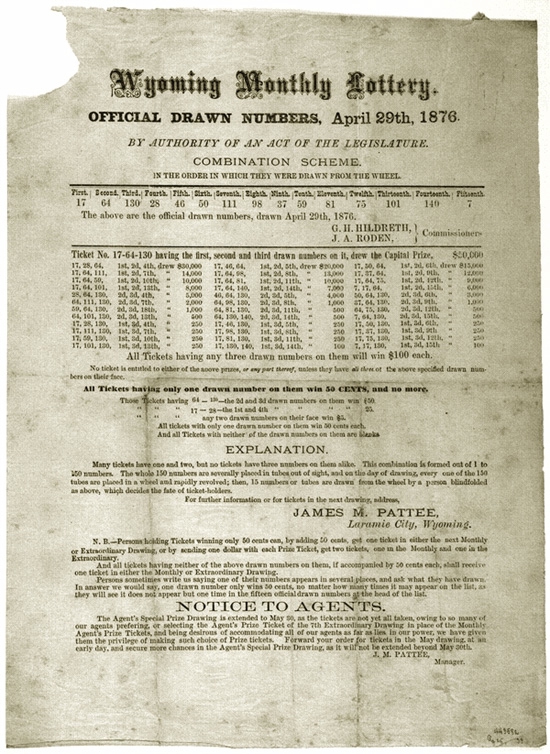
Broadside for Wyoming Lottery
In 1875, there apparently appeared upon the scene James Monroe Pattee (1823-1889) who established the "Wyoming Lottery."
The word "apparently" is used. Later Pattee would claim that he had never been in Wyoming. Pattee had previously run a lottery
in Omaha. The Omaha lottery, ostemsibly for charitable purposes, was characterized by national
advertising and a lack of drawings for the advertised prizes.
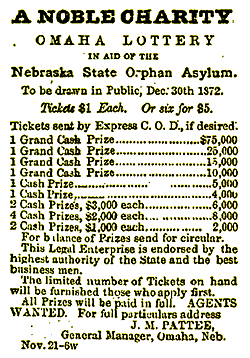 Advertisement for the
"Omaha Lottery." Advertisement for the
"Omaha Lottery."
Ultimately amidst a scandal involving the Omaha postmaster, Patee withdrew from Nebraska.
In 1873, Pattee was arrested
in Leavenworth, Kansas, allegedly on his way to Europe. Before the Civil War he had run a fraudulent
land scam in Illinois. There, in 1853, Pettee created a land development called "Monroeville." As observed
in the Atlas of Henry Co. and the State of Illinois, Warner & Beers Publishers, Chicago, 1875,
"The lots were disposed of at the East by Patteee, in a manner altogether too sharp to be honest."
In Wyoming, Pattee resumed his operations as the "Wyoming Lottery," the "Cheyenne Lottery," and
the "Laramie Lottery." As in Omaha, the schemes, however, was entirely fraudulent. There were many 50 cent winners, but little else.
Local newspapers and politicians looked the other way or really thought the emperor was done up in
new duds. When it came to eating at the trough of very large printing jobs, all would slop
together. The largest printing jobs for local printers, in which there were more than enough for all,
were the printing of
broadsides and lottery tickets for Pattee's lotteries.
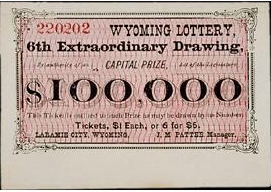 Wyoming Lottery Ticket
Wyoming Lottery Ticket
As Professor
Larson observed:
Drawings were never held. The Laramie Sentinel and the Laramie Sun were profiting too much from printing
lottery circulars to permit editors Hayford and Slack to crusade against the lottery, as
their normal instincts in other circumstances might have prompted them to do. Pattee contributed liberally
to all worthy causes in the community and wisely refrained from selling
lottery tickets locally. In 1876, Congress terminated Pattee's lottery
by making it a felony to use the mails to swindle the public. After he was no
longer profiting from the Pattee swindle, Hayford of the Sentinel warned that theiving swindles
could soon give the territory a bad reputation and frighten away prospective investors.
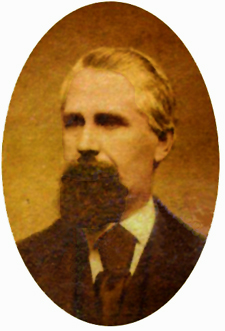 James M. Pattee James M. Pattee
But as the Wyoming Lottery came to an end, Pattee came up with new schemes. Just as Bill Nye made references to
wothless mining stocks, the opportunies for the sale of investments in gold m;ining stocks did not go
overlooked. Pattee organized a series of mining companies which sold stock to gulible investors. Included
were the "G & S Mining Company" allegedly headquartered in Rawlins, The Seminole Gold and Silver Company, the Bullion Gold
Mining Company, The Bullion Gold Mining Company, and the Cabarres Gold Mining Company. To take advantage of the
Black Hills Gold Rush, he also organized the American Gold and Silver Mining Company and the Black Hills Information
Company. The various companies sold stock to unsuspecting investors.
At first, The Laramie Sentinel supported
Pattee's new enterprizes. But as in the case of the lottery, editor Hayford had a change of heart and
wrote:
A SWINDLE.--We are frequently receiving letters asking for information about the SEMINOLE GOLD AND SILVER MINING COMPANY.
We can't answer these letters--there are too many of them. But we will state in the most public manner possible,
that the Seminold Gold and Silver Mining Company, J. R. Brown, President, with headquarters at Rawlins, W.T., IS A PURE FRAUD, SWINDLE AND
STEAL. J. M. Pattee of lottery fame, is a the bottom of it. THERE IS NO MINE, NO MILL, NO MACHINERY THERE, and never
will be, and every man who purchases stock in it, is merely contributing to a lot of dishonest Dead Beats who are
making their living by fuiling the public. If anyone has any doubts on this score
we refer them to the Governor, the Judges of the Supreme Court of Wyoming,
or any other responsible party.
With regard to the mining scheme, Pattee, J. R. Brown, and Isaac Ludlum another compatriot in the scheme, were all indicted by a
Wyoming grand jury for using mails to defraud.
Only Brown could be found in Wyoming. Pattee was safely ensconced in New York with offices on Park Row where his mining
stock ventures continued. In 1877, new indictments were obtained in New York. Pattee was arrested on the warrant from
Wyoming. He defended on the basis that he was only a shareholder and that he had never been in Wyoming. Pattee was released on
$2,500 bail. No convictions were ever obtained. Ludlum moved to New Brunswick, Canada, from where the schemes continued.
Pattee moved to Europe, but returned in 1888 to St. Louis, Missouri, and died within a few months.
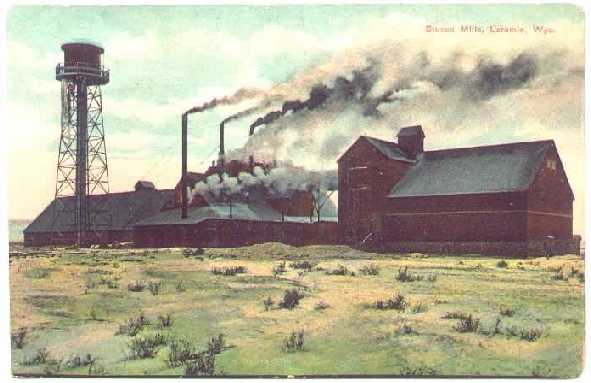
Acme Cement Works, Laramie, 1901
In 1898, Omaha hosted the TransMississippi & Industrial Exposition which show
cased the development of the TransMississippi West. Building were sponsored by many states
including Georgia and New York. There were over 4,000 separate exhibits and over
2,600,000, including President McKinley and Wm. F. Cody, visited the exhibition. The head of
the mining exhibition complained in his report as to the disinterest by Wyoming
and Montana. Nevertheless, Acme Cement and Plaster won a gold medal.
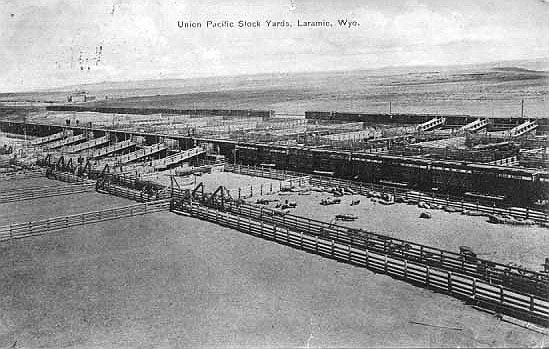
Laramie Stockyards, 1910
Laramie Photos continued on next page.
|